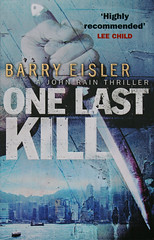Last week, two potentially watershed events occurred right before our eyes — one best-selling author refused an advance of $500,000 in order to self-publish his next two novels, while a self-published author who has made more than $2 million so far decided to accept her first traditional publishing contract.
It’s tempting to view these events as potentially canceling one another out, but that’s hardly the case. In fact, they both show how many book authors are now fully in charge of their fates.
Barry Eisler, the author of two best-selling series of thrillers, declined a traditional publishing deal with a hefty advance after his 12-year-old daughter brought him to his senses:
My wife and daughter and I were sitting around the dinner table, talking about what kind of contract I would do next, and with what publisher. And my then eleven-year-old daughter said, “Daddy, why don’t you just self-publish?”
Eisler had also been talking with J.A. Konrath, an author who at first dabbled in self-publishing, slammed it for a period when he was being published traditionally, then returned when the traditional publisher became fickle. In an excellent interview Konrath had with Eisler, Eisler boils down the times in a compelling way:
There’s a saying about the railroads: they thought they were in the railroad business, when in fact they were in the transportation business. So when the interstate highway system was built and trucking became an alternative, they were hit hard. Likewise, publishers have naturally conflated the specifics of their business model with the generalities of the industry they’re in. As you say, they’re not in the business of delivering books by paper–they’re in the business of delivering books. And if someone can do the latter faster and cheaper than they can, they’re in trouble. . . . They recognize they’re becoming non-essential, and are trying to keep themselves essential–but are going about it in the wrong way. . . . they’re drawing the wrong conclusions. The wrong conclusion is: I’m in the paper business, paper keeps me essential, therefore I must do all I can to retard the transition from paper to digital. The right conclusion would be: digital offers huge cost, time-to-market, and other advantages over paper. How can I leverage those advantages to make my business even stronger?
Every publisher of books and journals should cut that paragraph out and post it in a highly visible location.
At the same time, Amanda Hocking, the self-publishing phenomenon who recently came to wide attention after reporters learned she’d managed to earn millions of dollars selling her novels mostly as e-books, accepted a traditional publishing contract with St. Martin’s Press. Yet her reasons for doing so have nothing to do with self-validation or marketing help or vanity. Instead, it has to do with getting better editing help and helping readers find her books in stores. Most significantly, Hocking writes so quickly that the books she’s committing to St. Martin’s are basically written, and she’ll still be able to self-publish other novels she’s working on.
Mike Shatzkin notes that Eisler’s decision will send deep tremors throughout the publishing world:
As news of Eisler’s decision spreads, phones will be ringing in literary agencies all over town with authors asking agents, “shouldn’t I be doing this?” . . . the direction of change makes this decision likely to make more sense to more authors each successive week than it did the week before.
Authors in some fields of our scholarly realm now have similar choices — pay to publish more quickly and, in some cases, just as prestigiously, or pay nothing, wait longer, and gain what may be only marginally more prestige.
Perhaps what summarizes the changes best is a quote from David Carnoy, an author who has experience both self-publishing and publishing traditionally:
I suspect that the most successful and truly talented indie writers will end up with some form of traditional publishing deal at some point in their careers. It’s one thing if you’ve already been published and are moving to self-publishing for all the pros mentioned. But ultimately, it’s good to be able to say you were “really” published–and experience it, for better or worse.
For better or worse. Ultimately, that’s the question an author can consider now, and with many options in between those two extremes.
Discussion
23 Thoughts on "Traditional Publishing and Self-Publishing — Authors Now Call the Shots"
Many book publishers realise they are in a digital world. Where they have not got it right is in their business models. Many readers of e-books become frustrated by business approaches such as agency pricing or geographical rights restrictions, which seem to them (ie readers of the e-format) nonsensical. Sadly, many of them are thus inclined to download easily available pirate editions.
So, I would not say it is that publishers are wedded to the print format (most publishers now provide simultaneous e-books for purchase with print/audio editions, some eg Corvus in the UK, are making the e-editions available before the print is published). More accurate is that they are wedded to print-based business models and need to change that quickly as they are haemmhoraging money away to the pirates.
From a former fiction agent’s perspective: http://blog.nathanbransford.com/2011/03/self-publishing-vs-traditional.html
One thing I observe about Amanda Hocking, is that she wrote a book and then immediately was able to test the market for her writing in a largely frictionless way. My understanding is that traditionally, the author must first write the book and then spend months and years submitting manuscripts and awaiting the rejection letters.
Having repeatedly tested the market, Amanda rapidly realised that she could quit her job and write full time. Now the publisher has come to her with what seems to be an excellent deal for her.
So if you are a starting author, the message seems to be, try it yourself first – at least you’ll have an idea of what the market thinks your story is worth. It seems a better use of your time, than soliciting rejection letters.
One thing I thought was particularly interesting was the reasoning Hocking gave for signing on with publisher when intereviewed:
“I want to be a writer,” she said. “I do not want to spend 40 hours a week handling e-mails, formatting covers, finding editors, etc. Right now, being me is a full-time corporation.”
While Hocking could continue to do all these jobs herself, they take away from what she does best, and what she clearly wants to do: writing books. Some things are worth paying other people to do.
I’m having this troubled debate now. I love the ease with which I can upload a book to Kindle and begin selling it. However, the editing, putting it together etc (as you will see in my book) not my forte. Nor do I want it to be. However, I’m willing to sacrifice looks, for content, and the ability to not grovel to someone for them to determine the quality of my writing.
I think it goes beyond mere editing and design. I was surprised to see well-known authors who lean strongly toward a copyleft, DIY, freemium business model writing passioned defenses of their publishers, and the great value they receive from them (Charlie Stross for one, Cory Doctorow as another example). There are compelling economic reasons for going with a traditional publisher. Yes, you can likely hire freelancers to fill most of the roles a publisher provides, but then you’re financially responsible for doing so. You must invest the money upfront to pay all those people, and hope your book sells well enough to at least break even. With a publishing house, those costs are covered and you are not responsible, no matter how well your book sells. Even better, you’re likely earning an advance, which you don’t have to pay back if your book fails to sell, so you end up ahead of the game with very little risk.
You could go it on your own, but for many, the economics and the risk of debt should the book fail make the financial aspects of working with a publisher preferable to gambling on the potentially bigger rewards of self-publishing. Some groveling may be the price one pays for receiving no-risk financing for a project like this.
Here are some thoughts based on what I’m doing as a new author. http://wp.me/p1cI9S-1W
Whether or not an established author should forego the financial reward. I wouldn’t. As a new author, risking the potential reward is what entrepreneurship is all about. So maybe new authors need be entrepreneurs as well.
I guess I’d rather pay for the freedom of self-publishing. I can work within my own timeline, get the cover I want, choose an editor I like and work well with…Yes, it costs me, but I guess you get what you pay for!
That’s the balance each author must seek for themselves. There are some things you are interested in doing (and have the time and skills to do well), while other activities may be better accomplished by outsourcing (either to a publisher or a freelancer). The new technologies open up more avenues for a more diverse group of approaches, which is a good thing.
Of course, she is in a position to pay other to do these things for her, and that is great. She should take advantage of what’s offered. But for those like me, who are just starting to make a name for themselves, I am very happy ebooks and the social network are leveling the playing field. The paper market is just to limited in this global market. They have their place, and I hope they don’t go away, (there is alot of talent there and brain power) but they are now only a piece in the puzzle.
If Hocking is mainly looking for good editorial help, she may end up being disappointed. Publishers for years have been cutting back on copyediting and proofreading, even university presses that still do more of this than anybody else.
One major reason authors used to need to go with major publishing houses is that only through them could they get their books into bookstores. But with online retailers like Amazon dominating as a sales channel now, and companies like Borders going under, this reason is fast disappearing. Marketing can be done effectively through social media now, especially for niche markets, so one indeed wonders what “value added” traditional publishers still have to offer.
University presses do have one advantage here: scholars need the prestige of their imprints to gain tenure and advance in their careers. Branding remains key, at least for this sector.
I agree – there are chances here for smaller publishing houses that have a clear focus/niche and are therefore visible in their respective fields. These need not be university presses. Larger conglomerates will remain to dominate the market for now, but this may change sooner than we think.
I was able to publish in about an hour onto the most powerful platform in the world. The Adventures of Conrad Von Supertramp are now available on Kindle. This freedom to be published without the judgement of others is liberating and rewarding for those of us raised in the instant gratification world of video games and computers. No nasty rejection letters, at worse a comment or review, but most won’t even take the time to review it if they don’t like it. With the ability to add custom videos, pictures and more, utilizing transmedia. What a world we have at our fingertips. A world for heros to come forth and share the tales of adventures available in the vast reaches of the Universe Wide Web
just to add to the Amanda Hocking aspect – there are a vast number of authors selling self-published books by one means or another (Lulu, Kindle, Smashwords, et al) who are lucky if they sell half a dozen copies. Most of the self-published books for sale in the Kindle top 100 are genre (eg fantasy as Amanda H, Sci Fi, Horror etc) or specialised non-fiction such as self-help. Nothing that I personally would want to read, so far. (Despite the cutting back on editing services by publishers, what you read in a properly published book is vastly superior to self-produced, based on the half-dozen or so self-published books I’ve read, invariably too long and poor QC).
It is important, when looking at writers like Hocking and Eisler, to realize that they are outliers, and not at all indicative of the typical path taken by self-publishing authors.
Mike Shatzkin had a good post recently talking about how the ebook market is incredibly concentrated on a remarkably small number of bestsellers due to the lack of browsing capability for shoppers.
re: “with authors asking agents, ‘Shouldn’t I be doing this?”
Well, that day came last January according to Publisher’s Weekly who released a poll revealing that 90% of the agents surveyed were, indeed, being asked the $2 million question by their clients. Ninety percent. The ‘wrap’ sentence in PW was something to the effect that the agents weren’t concerned. I remember leaving a comment at the end of THAT blog…”Really? ‘Not concerned?’
I would predict that by the end of 2011 more TradPubs will have transformed to IndiePubs, and won’t it be sport to watch?
I see the benefits of both. After self publishing my book “The Prayer Monologues” I realized that I would have to do more of the legwork and spend mornings sending out emails and doing the social media thing. The result? On Smashwords I had 29 downloads of the book while it was FREE. When I started charging $1.99 for it I got zero sales.
I think for my next book I will try traditional publishing. I don’t really need anyone to tell me I can write. I can write and still admit I may need a bit of help. But going tradtional may free me up to do what I love.




